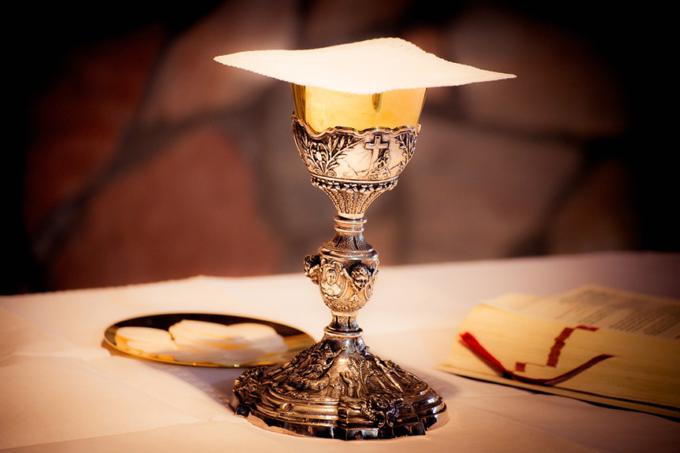
Faith
Because we believe that Jesus is physically, bodily present in the "sacred species" (our term for the bread and wine which have been turned into the body and blood of Christ), we have several laws and customs pertaining to the Eucharist which ensure a sufficient degree of protection and reverence for Jesus' presence in the Blessed Sacrament.

Cooper
Q: My parish recently returned to communion under the second species. A eucharistic minister holds one cup and one cloth and does one wipe after each serve. Most people are still not receiving it for fear of COVID or other illness. Why can't the church simply use disposable plastic cups with the wine already in it? The priest could say the same blessing and the eucharistic minister could still distribute but holding a tray instead of a cup. The empty cup could be disposed of with the passing of germs reduced to almost nothing. (Lanesville, IN)
A: What you describe -- with the elements of communion pre-portioned in individual disposable packaging -- is not uncommon in many non-Catholic Christian communities. However, there are several reasons why this would be inappropriate for Catholic worship.
For context, we need to recall that the Catholic theology of the eucharist is radically different from the vast majority of Protestant understandings of holy communion. Many Protestant communities occasionally distribute bread and wine (or even grape juice) as a way of simply recalling and remembering Jesus' last meal and the friendship he shared with his disciples.
In contrast, a core central teaching of the Catholic faith is the doctrine of the "real presence," meaning that bread and wine literally become the body and blood of Christ at Mass when the priest prays the prayer of consecration. In technical philosophical terms this process is called "transubstantiation," and because of it the prayer of consecration is much more radical and impactful than a simple blessing would be.
Because we believe that Jesus is physically, bodily present in the "sacred species" (our term for the bread and wine which have been turned into the body and blood of Christ), we have several laws and customs pertaining to the Eucharist which ensure a sufficient degree of protection and reverence for Jesus' presence in the Blessed Sacrament.
For instance, it is required that the vessels used during the Eucharist such as the ciborium, paten, and chalice (the "plates" and cup) be made from worthy and suitable materials. As paragraph 328 of the General Instruction of the Roman Missal tells us: "Sacred vessels should be made from precious metal. If they are made from metal that rusts or from a metal less precious than gold, they should generally be gilded on the inside." Clearly, this directive is incompatible with the use of disposable communion cups!
Additionally, during the Mass the priest must take care that every particle of the host and every last drop of the Precious Blood are reverently consumed. This is why, at the end of communion, the priest "purifies" the chalice, rinsing it with water that he then drinks himself. Even if disposable materials were allowed, there would be no way to be sure that absolutely all Precious Blood was actually consumed. As a result, it would be impossible not to have some of the Precious Blood wind up in the trash. This would be at least de facto sacrilege.
It is certainly understandable that some Catholics might long for the fuller sign value of receiving communion under both kinds, while still having legitimate concerns about germs and the spread of illness. Still, it's good to keep in mind that few things worth doing are ever one hundred percent risk-free. Most things in this life involve some sort of tradeoff of risks versus benefits. Catholics who piously desire to receive the Precious Blood should prayerfully consider whether, in light of their own personal health status and spiritual needs, it might make sense for them in their own circumstances to brave the possibility of catching a bug in order to receive from the chalice.
In any case, we should always remember that in receiving the Eucharist under only one species, bread or wine, we nevertheless receive the entirety of Christ.
- Canonist Jenna Marie Cooper is a consecrated virgin, a practicing canon lawyer, and columnist for OSV News.
Recent articles in the Faith & Family section
-
7 reasons to pray for the cardinals in conclaveJaymie Stuart Wolfe
-
Legacies in Ordinary TimeLucia A. Silecchia
-
What are my Easter duties?Jenna Marie Cooper
-
On the Camino: Jentillaks and jazzMark T. Valley
-
From the Eternal CityArchbishop Richard G. Henning























